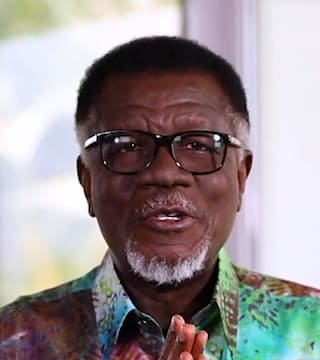Mensa Otabil - Not Called By Man (09/30/2025)
We’re considering the call of Samuel, a young boy who has been given as a gift to God, and now God wants to use him for His purposes. First Samuel, chapter 3, verse 5: «So he ran to Eli and said, 'Here I am, for you called me.' And he said, 'I did not call you; lie down again.' So he went and lay down.» Samuel knew someone had called him; he was very sure he had heard his name mentioned. He thought Eli had called him, but he wasn’t sure who it was. He went to the most logical place—Eli—and presented himself to him. Why would he go to Eli? Probably because Eli was used to calling him all day.
I can imagine an old man who is partially blind and weak, while Samuel is a boy running around the tabernacle and fixing things. Any time there was a need, Eli would call Samuel. He was used to hearing Eli call his name. So, at dawn, when he hears his name called, the logical thing is to go to the man who calls him all the time. I like Eli’s response: «I did not call you; go and lie down.» We all know that our calling does not come from another human being. It is God who calls us. Although people can play important roles in our lives, they are not the owners of our destiny or the purpose of our lives. We must not give the credit for our lives to someone else.
When we talk about a calling, most of you might think about someone called to be a prophet. You might say, «I’m not a prophet, I’m not a pastor; I’m just a doctor, a nurse, a teacher, a carpenter, or a computer analyst.» Those are all callings. A calling is an inward drive, an inward urge within yourself to do something with your life. If you truly feel that what you’re doing is what you must be doing with your life, that’s a calling. We must always identify the source of our calling.
Samuel owed so much to Eli, like most of us owe so much to others. Eli was the one who prophesied to his mother; he was the priest who received him when his mother took him to the temple. Eli was the one who trained him. Even though Samuel was from the tribe of Ephraim, Eli trained him in the Levitical priesthood. If Samuel had to give credit to anyone, it would be to Eli. When he goes to Eli and says, «You called me,» Eli responds, «I didn’t call you.»
When we think our calling comes from another human being, we seek validation and rewards from them. But when we realize that our calling comes from God, we seek His validation and reward. This is very important, no matter what organization you work in or whom you serve in life. Remember that the person or organization is not the owner of your calling; God calls you, and He is the one who gives you fulfillment and joy.
Although someone else may be your boss, and you serve faithfully under that boss, remember your calling comes from God, and your joy and gratitude come from Him. You’re not doing it unto man; you’re doing it unto the Lord if it’s truly a calling. The Lord whom you honor will honor you. Eli said, «I did not call you,» and I just want you to know that no man, no woman, and no organization called you. If you are truly called, your calling originated from the Lord. I am glad there are Eli’s who do not try to play God in the lives of others.
Let’s pray. Say with me: «Heavenly Father, You are the source of my calling and purpose. I thank You that You know what to do with my life. In Jesus' name, amen.» Well, my friends, God is the source of your calling. Trust Him for your reward. Pastor Mensa Otabil, Shalom, peace, and life to you.

